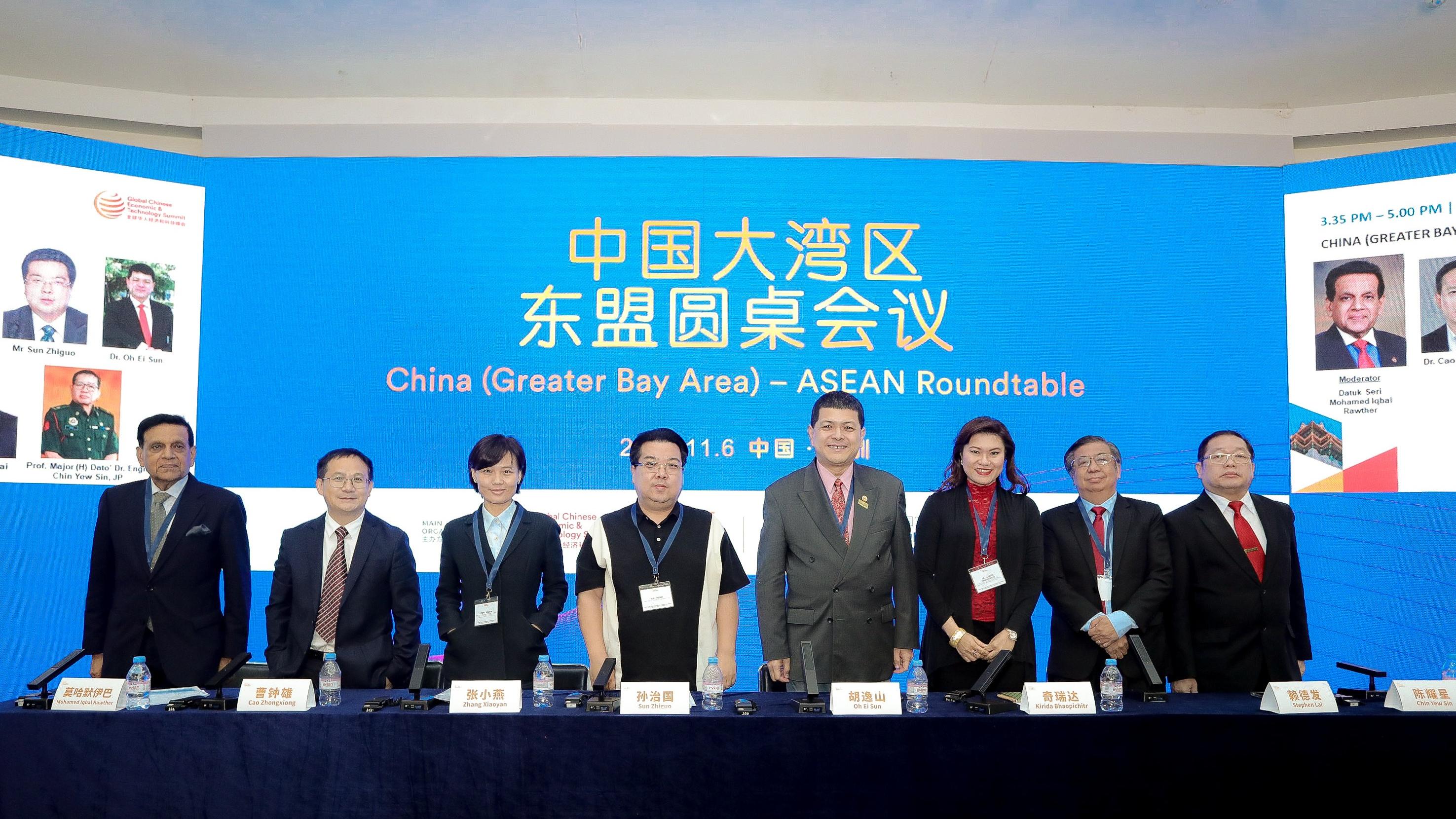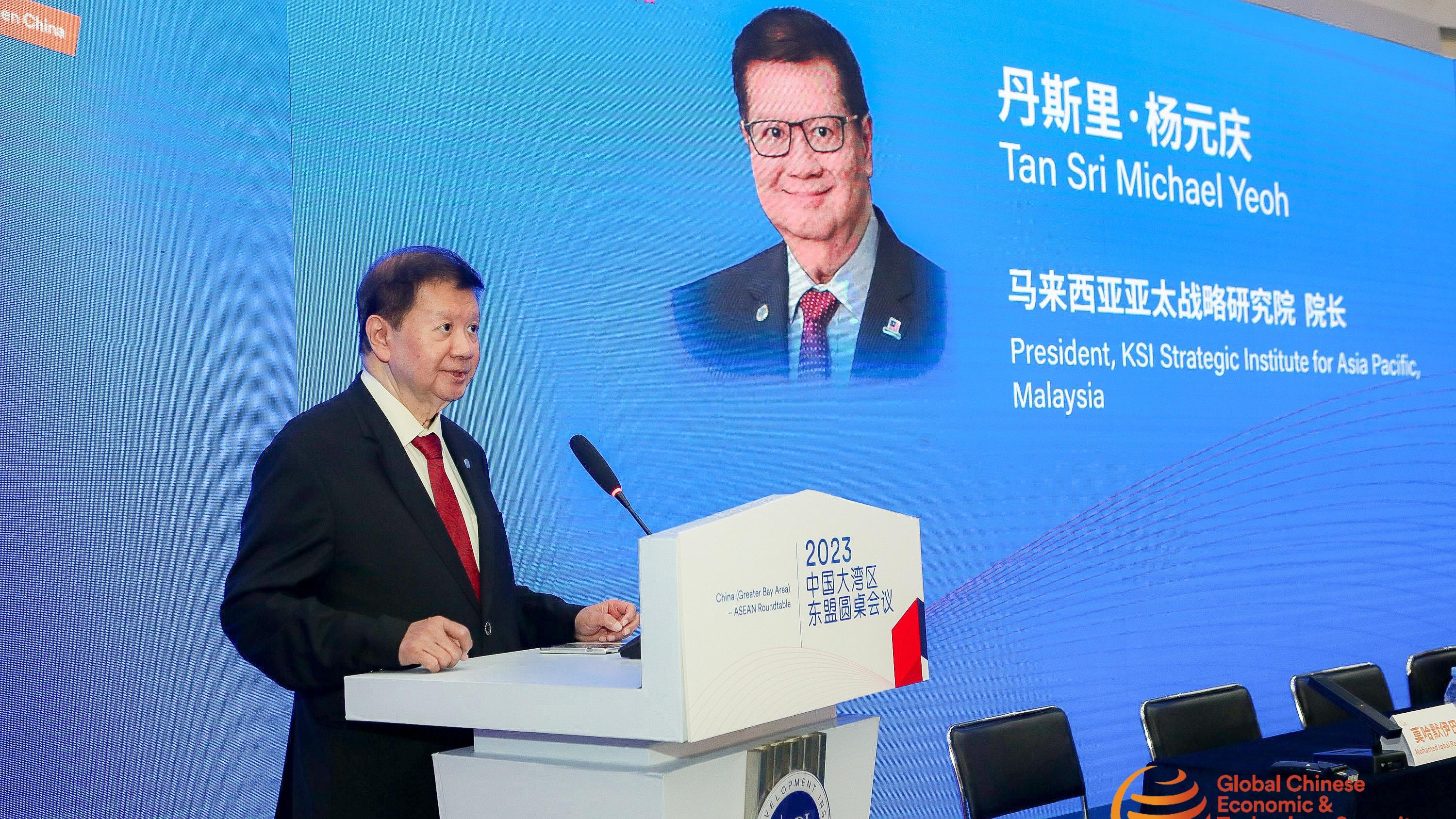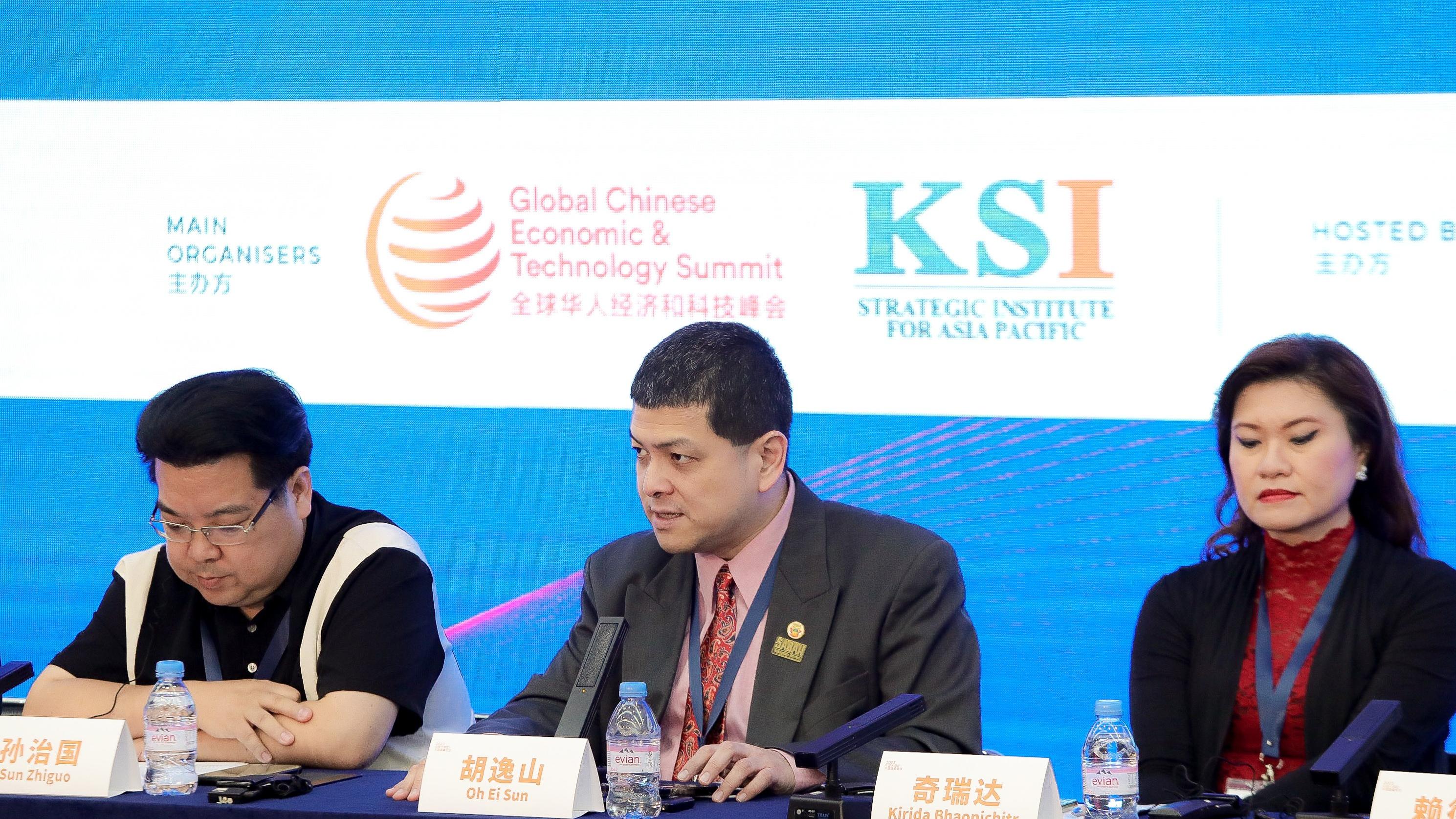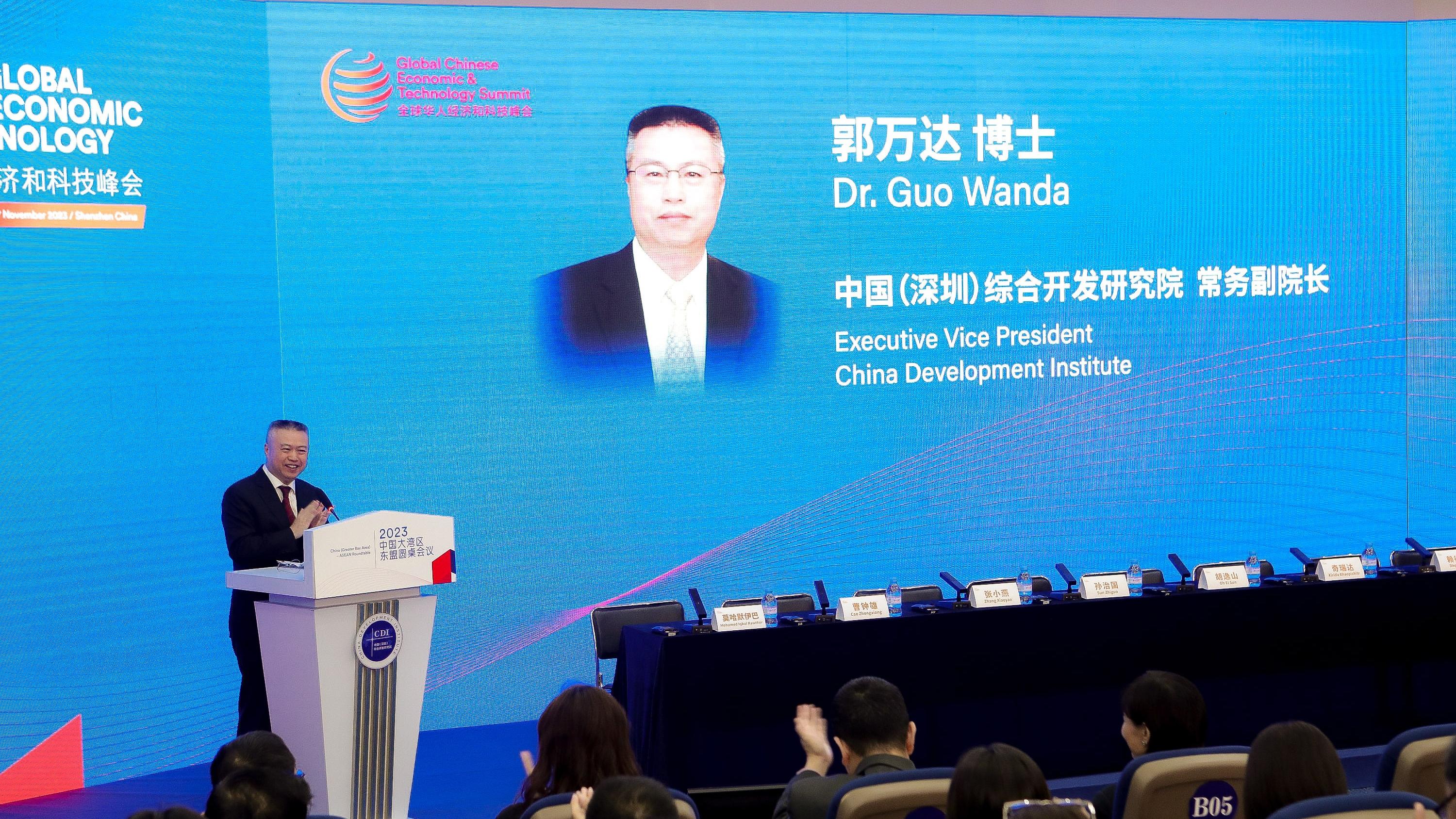 Participants of the China (Greater Bay Area) – ASEAN Roundtable pose for a photo in Shenzhen, Guangdong province, during the 2023 Global Chinese Economic & Technology Summit (GCET) on Nov 6. (PHOTOS PROVIDED TO CHINA DAILY)
Participants of the China (Greater Bay Area) – ASEAN Roundtable pose for a photo in Shenzhen, Guangdong province, during the 2023 Global Chinese Economic & Technology Summit (GCET) on Nov 6. (PHOTOS PROVIDED TO CHINA DAILY)
More mutual investment and collaboration between countries and regions is vital to counter growing geopolitical risks and truly achieve global economic prosperity, according to speakers at the 2023 Global Chinese Economic & Technology Summit.
The two-day GCET, launched in Shenzhen on Nov 6 and themed "Great Reset: Powering Growth, Technology, and Regional Prosperity", brought together a diverse group of thought leaders, business magnates, and government officials from around the world.
“As risks of geopolitics have greatly increased, such as the continuation and escalation of the Russia and Ukraine conflict, it has clouded over the post-pandemic global economic recovery,” said Lim Gait Tong, special envoy of the Shandong Provincial Government for Investment and Trade for ASEAN.
READ MORE: Number of foreign funds in China rises as prospects brighten
According to Lim, who is also president of the China-ASEAN Business Association (CABA), the way to deal with the risks is to encourage more regional investments. He emphasized the important role that the Regional Comprehensive Economic Partnership (RCEP) has played in advancing economic and trade opportunities among its members.
 Michael Yeoh, organizing chairman of the Global Chinese Economic & Technology Summit, says the event focuses on 4Ps – Peace, Partnerships, People, and Planet for global shared prosperity. (PHOTOS PROVIDED TO CHINA DAILY)
Michael Yeoh, organizing chairman of the Global Chinese Economic & Technology Summit, says the event focuses on 4Ps – Peace, Partnerships, People, and Planet for global shared prosperity. (PHOTOS PROVIDED TO CHINA DAILY)
Michael Yeoh, organizing chairman of the Global Chinese Economic & Technology Summit, said that the world has entered a new era of technological advancement and regional cooperation, so “the event also embodies the spirit of progress and collaboration”.
The summit focused on the 4Ps – Peace, Partnerships, People, and Planet for global shared prosperity – said Yeoh, who is also president of the KSI Strategic Institute for Asia Pacific in Malaysia.
Malaysia’s former foreign minister Anifah Aman gave the keynote speech.
“In an era characterized by transformative changes, unforeseen challenges, and remarkable opportunities, the relationship between ASEAN and China has transcended conventional cooperation, evolving into a dynamic and strategic partnership with the potential to redefine the trajectory of regional and global economics,” he said.
China, as the paramount trading partner of ASEAN and a notable investor within our shared ecosystem, stands as a resounding testament to the intricacies of our economic interdependence, said Anifah, who is also chairman of Invest Sabah, the investment arm of Malaysia’s Sabah state.
In recent discussions, ASEAN member states and China not only explored elements to be incorporated into the upgraded ASEAN-China Free Trade Agreement (ACFTA) structure but also delved into the dispute settlement process, underlining their commitment to a fair and transparent mechanism for conflict resolution.
Anifah hailed the ACFTA as “a cornerstone of our economic integration”.
Sok Siphana, a senior minister in Cambodia, reflected on the milestones of the China-ASEAN relationship, such as its start in 1991 and upgrade in 2003, and also looks forward to the future.
At the China (Greater Bay Area)-ASEAN Roundtable, discussions are facilitated on strengthening partnerships between China and ASEAN to promote regional cooperation and growth. The cooperation among RCEP members in the digital and green economy for a sustainable shared future was also stressed.
 Speakers at the event discuss further cooperation of Greater Bay Area with ASEAN economies for mutual benefits on Nov 6 in Shenzhen. (PHOTOS PROVIDED TO CHINA DAILY)
Speakers at the event discuss further cooperation of Greater Bay Area with ASEAN economies for mutual benefits on Nov 6 in Shenzhen. (PHOTOS PROVIDED TO CHINA DAILY)
“China and ASEAN have come a long and fruitful way in building up a comprehensive relationship with each other. It is time, especially for the younger generations on both sides, to take these close ties to ever higher and mutually beneficial grounds,” said Oh Ei Sun, senior advisor of the Singapore Institute for International Affairs.
As a basis for such cooperation, young people from both China and ASEAN countries should get to know each other better, he added.
Kirida Bhaopichitr, the director of TDRI Economic Intelligence Service at the Thailand Development Research Institute, noted the strong economic ties between China and Thailand — trade, investment, and tourism.
She also mentioned the challenging balance that smaller countries like Thailand face amid the current geopolitical tensions between the US and China, which may see a realignment of many sectors including supply chains, technology, energy, and currency.
Wang Huiyao, founder and president of the Center for China and Globalization and former counselor to China’s State Council, said that in the spirit of economic and technological cooperation, China and ASEAN links have huge potential.
“I think that China, particularly the Greater Bay Area, collaborating with ASEAN, (can help) produce another miracle,” said Wang via video link.
 Guo Wanda, executive vice president of the China Development Institute, addresses the roundtable on Nov 6 in Shenzhen. (PHOTOS PROVIDED TO CHINA DAILY)
Guo Wanda, executive vice president of the China Development Institute, addresses the roundtable on Nov 6 in Shenzhen. (PHOTOS PROVIDED TO CHINA DAILY)
Guo Wanda, executive vice president of the China Development Institute said that 2023 marks the 10th anniversary of the Belt and Road Initiative, and the RCEP has entered the stage of full implementation, which will usher in more new opportunities for China-ASEAN cooperation.
“As one of the most open and dynamic regions in China, the Guangdong-Hong Kong-Macao Greater Bay Area and ASEAN countries are blessed with a good foundation for cooperation in terms of geographical location, industrial distribution, and personnel exchanges,” he said.
According to Guo, the Greater Bay Area has broad prospects for the coordinated development of ASEAN countries. “In the face of the complex economic environment and the intensifying international competition, only through open cooperation, integration of global resources, and promotion of scientific and technological innovation can we continue to gain competitive advantages,” Guo added.
READ MORE: Mutual fund firms reach deeper into China's capital market
The 2023 GCET was organized by the Shenzhen-based China Development Institute and the KSI Strategic Institute for Asia Pacific.
About 50 prominent local and foreign speakers from ASEAN countries and other parts of the world shared their knowledge, insights, and experiences on various pertinent issues affecting the global Chinese diaspora.
The summit had a multifaceted agenda, focusing on promoting high-level exchanges among government, business, and think tank leaders.
Contact the writer at vivienxu@chinadailyapac.com


